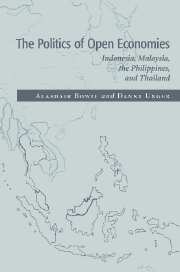4 - Malaysia
Published online by Cambridge University Press: 10 November 2009
Summary
For more than a decade following its independence in 1957, Malaysia was dominated politically by a small multi-ethnic elite that employed economic development to maintain political stability and avoid ethnic strife. This elite controlled a state apparatus that, for historical reasons and in contrast to the cases of Indonesia, the Philippines, and Thailand, was both extensive and relatively competent.
State resources came from import tariffs and from domestic sources, such as corporate income taxes, which were borne most heavily by the non-indigenous, commercial sector – foreign companies and those owned by immigrant Chinese and Indian minorities. These resources were applied to developing the rural sector and improving agricultural productivity as means to improve living conditions for the indigenous, largely rural, Malay community, the largest but least advantaged ethnic group.
This resource allocation was politically consequential: it ensured majority Malay support for the United Malays National Organization (UMNO), the largest of the three ethnic parties in the ruling coalition government. It also succeeded in making it more difficult for groups opposed to the governing elite – including those on the left, whose armed efforts in the guerilla insurgency known as the Emergency were defeated in the early 1950s, and those advocating an Islamic state for the largely Muslim population – from mobilizing popular movements among the poor and rural populations to oppose the ruling elite.
- Type
- Chapter
- Information
- The Politics of Open EconomiesIndonesia, Malaysia, the Philippines, and Thailand, pp. 67 - 97Publisher: Cambridge University PressPrint publication year: 1997

